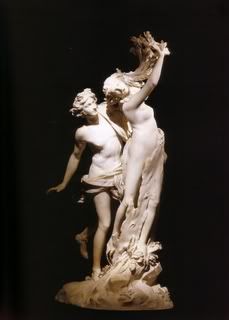Wednesday, April 11, 2007
Apollo & Daphne
Phoebus is lovestruck; having seen the girl,
he longs to wed her and, in longing, hopes;
but though he is the god of oracles,
he reads the future wrongly. Even as,
when grain is harvested, the stubble left
will burn, or as the hedges burn when chance
has led some traveler to bring his torch
too close, or to forget it on the road
when he went off at dawn, so Phoebus burns,
so is his heart aflame; with hope he feeds
a fruitless love. He looks at Daphne's hair
as, unadorned, it hangs down her fair neck,
and says: "Just think, if she should comb her lock!"
He sees her lips and never tired of them;
her fingers, hands, and wrists are unsurpassed;
her arms--more than half-bare-- cannot be matched;
whatever he can't see he can imagine;
he conjures it as even more inviting.
But swifter than the lightest breeze, she flees
and does not halt--not even when he pleads:
"O, daughter of Peneus, stay! Dear Daphne,
I don't pursue you as an enemy!
Wait, nymph! You flee as would the lamb before
the wolf, the deer before the lion, or
the trembling dove before the eagle; thus
all flee from hostile things, but it is love
for which I see you now! What misery!
I fear you'll stumble, fall, be scratched by brambles
and harm your faultless legs--and I'm to blame.
You're crossing trackless places. Slow your pace;
I pray you, stay your flight. I'll slow down, too.
But do consider who your lover is.
I'm not a mountain dweller, not a shepherd,
no scraggly guardian of flocks and herds.
Too rash, you don't know whom you're fleeing from;
in fact, that's why you run. I am the lord
of Delphi's land, and Claros, Tenedos,
and regal Patara. Jove is my father.
Through me, all is revealed: what's yet to be,
what was, and what now is. The harmony
of song and lyre is achieved through me.
My shaft is sure in flight; but then there's he
whose arrow aimed still more infallibly,
the one who wounded me when I was free
of any love within my heart. I am
the one who has invented medicine,
but now there is no herb to cure my passion;
my art, which helps all men, can't hear its master."
He'd have said more, but Daphne did not halt;
afraid, she left him there, with half-done words.
But even then, the sight of her was striking.
The wind laid bare her limbs; against the nymph
it blew; her dress was fluttering; her hair
streamed in the breeze; in flight she was more fair.
But now the young god can't waste time: he's lost
his patience; his beguiling words are done;
and so--with love as spur-- he races on;
he closes in. Just as a Gallic hound
surveys the open field and sights a hare,
and both the hunter and the hunted race
more swiftly--one to catch, one to escape
(he seems about to leap on his prey's back;
he's almost sure he's won; his muzzle now
is at her heels; the other, still in doubt--
not sure if she is caught--slips from his mouth;
at the last instant, she escapes his jaws):
such were the god and girl; while he is swift
because of hope, what urges her is fear.
But love has given wings to the pursuer
he's faster--and his pace will not relent.
He's at her shoulders now; she feels his breath
upon the hair that streams down to her neck.
Exhausted, wayworn, pale, and terrified,
she sees Peneus' stream nearby; and cries:
"Help me, dear father; if the river-gods
have any power, then transform, dissolve
my gracious shape, the form that pleased too well!"
As soon as she is finished with her prayer,
a heavy numbness grips her limbs; thin bark
begins to gird her tender frame, her hair
is changed to leaves, her arms to boughs; her feet--
so keen to race before--are now held fast
by sluggish roots; the girl's head vanishes,
becoming a treetop. All that is left
of Daphne is her radiance.
And yet
Apollo loves her still; he leans against
the trunk; he feels the heart that beats beneath
the new-made bark; within his arms he clasps
the branches as if they were human limbs;
and his lips kiss the wood, but still it shrinks
from his embrace, at which he cries: "But since
you cannot be my wife, you'll be my tree.
O laurel, I shall always wear your leaves
to wreathe my hair, my lyre, and my quiver.
When Roman chieftains crown their heads with garlands
as chants of gladness greet their victory,
you will be there. And you will also be
the faithful guardian who stands beside
the portals of Augustus' house and keeps
a close watch on the Roman crown of oak leaves.
And even as my head is ever young,
and my hair ever long, may you, unshorn,
wear your leaves, too forever: never lose
that loveliness, o laurel, which is yours!"
Apollo's words were done. With new-made boughs
the laurel nodded; and she shook her crown,
as if her head had meant to show consent.
- from Metamorphoses, Part of "Apollo & Daphne" by Ovid (translated by Allen Mandelbaum)
Subscribe to:
Post Comments (Atom)

No comments:
Post a Comment